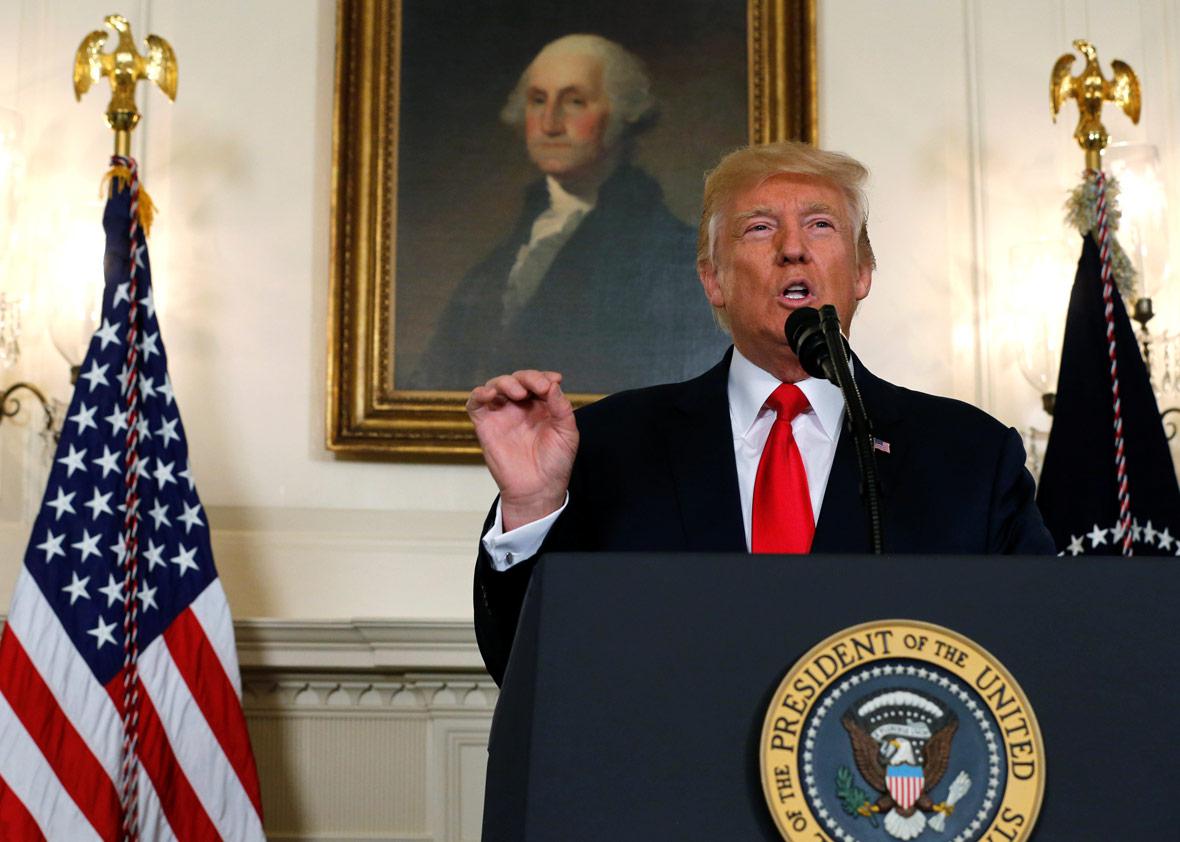On Saturday, President Donald Trump responded to a white supremacist rally in Charlottesville, Virginia, with a prepared statement that condemned “this egregious display of hatred, bigotry, and violence on many sides.” He then appeared to ad lib that nullifying qualifier into a refrain: “on many sides.” Trump was deservedly criticized for, as my colleague Josh Levin put it, “All Lives Matter[ing] a Nazi rally.” Along with being awful, the president’s original speech was notable for its absence of Trump-ian rhetoric. Whereas he usually spins division into political gold, this time Trump preached a kind of horrifying togetherness. The address, tiptoeing instead of name-calling, politely declined to address the Klansmen and neo-Nazis who’d marched through Virginia. Trump didn’t just come down softly on fascist terrorists. What made Saturday’s address so remarkable was that he bent so many of his own rules to do so.
On Monday, the president went back to normal. Or at least, he displayed all the now-familiar tics of a man allergic to accountability and desperate for praise, a man delighted to accept our congratulations on the sagacity of his responses to horror. After a few minutes of throat-clearing about his feats on behalf of the American worker, Trump reiterated, almost word for word, his language from the weekend. “As I said on Saturday,” he told reporters, “we condemn in the strongest possible terms this egregious display of hatred, bigotry, and violence.” Trump then continued: “And as I have said many times before, no matter the color of our skin,” we all “salute the same great flag. … Racism is evil and those who cause violence in its name are criminals and thugs.”
It was a neat substitution: Instead of “on many sides,” the president offered another seemingly inconsequential phrase—“as I said.” Over the weekend, Trump failed, resplendently, to denounce the gun-waving race vigilantes who instigated a riot in Charlottesville, one that ended in the death of a woman who was run over by a white supremacist. On Monday, he strode up to the podium and pretended that he’s not the kind of guy who’d embolden and encourage the alt-right. If you haven’t heard him declaring racism is evil, he said, that’s because you haven’t been listening.
Trump’s contempt for reality is such that he is not content to mislead the American people in the moment. He compounds the lie by telling us, in direct contradiction to what we’ve seen and heard, that he has always been doing whatever it is he wants to have been doing. No universe exists in which any Trump response could have possibly been inadequate or wrongheaded. Over the weekend, Trump delivered the perfect address to salve Charlottesville’s wounds and fire up its moral conscience. On Monday, he just repeated it for all us dummies who missed it the first time.
This insta-revisionism calls to mind the Lost Cause romanticism that insists slavery was always ancillary to the Civil War. Neither Robert E. Lee nor the statues cast in his image were ever really “about” white supremacy, we’re told, often by the same people who want to absolve Trump from his complicity in a fascist movement. Asked why he did not condemn hate groups by name over the weekend, the president replied, “They have been condemned.” Slavery, too, has been condemned, though not always all that vociferously by those who defend monuments to the Confederacy. Condemnations were made, is the point. Why do the work when you can simply steal the credit?
“As a candidate,” Trump intoned at his Monday press conference, “I promised to restore law and order to our country, and our federal law enforcement agencies are following through on that pledge.” Somehow, the commander in chief twisted the weekend’s melee in Charlottesville into evidence that he was succeeding. Ignore my deeds, Trump is telling us. What I’ve done is what I’ve said I’ve done.
